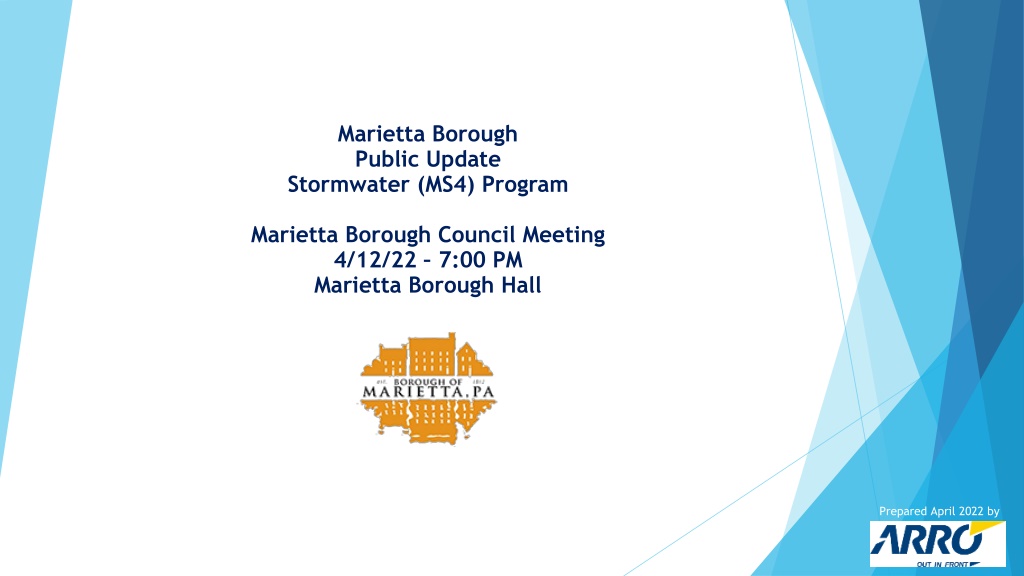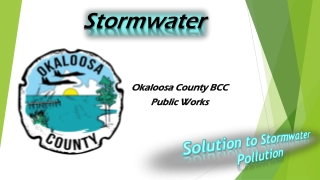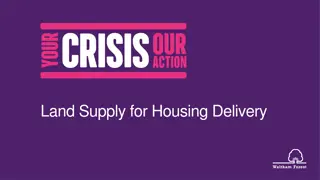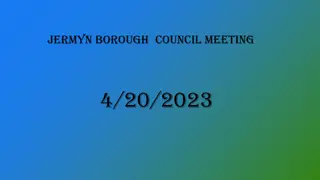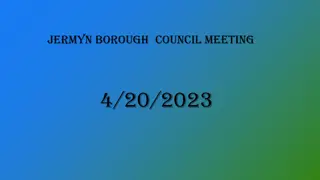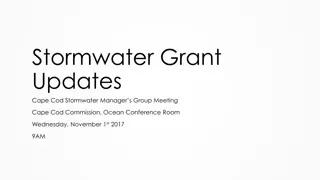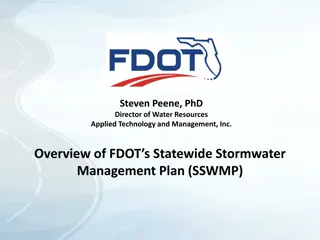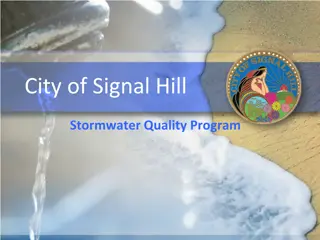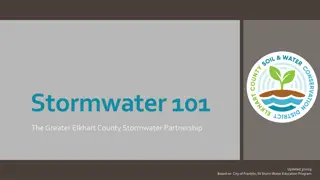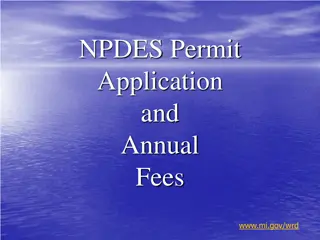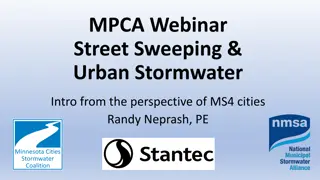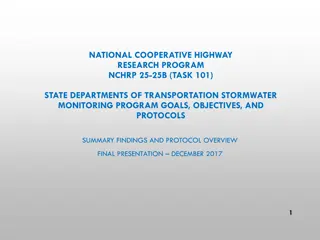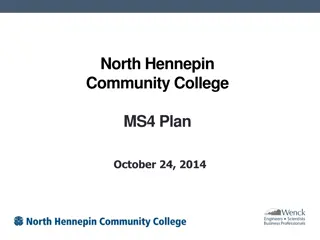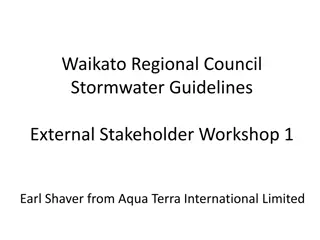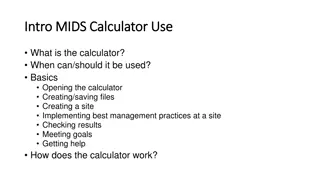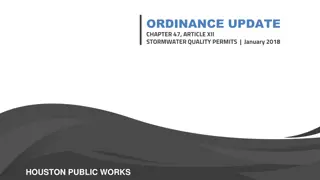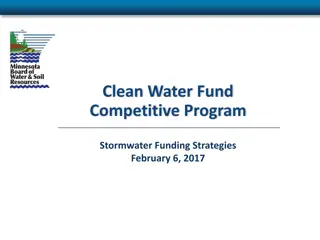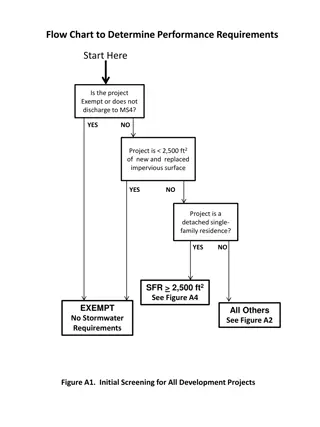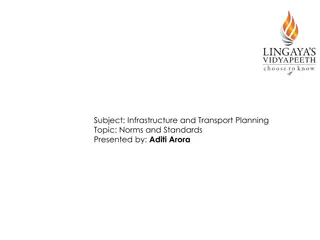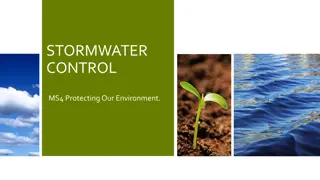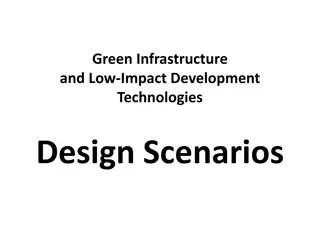Marietta Borough Public Update on Stormwater Program
Marietta Borough Council will discuss the Stormwater (MS4) Program at the upcoming meeting, covering topics such as the EPA's NPDES permit regulations, public education, illicit discharge detection, and pollution reduction plans. The program aims to manage stormwater discharges and comply with Pennsylvania DEP requirements under the Clean Water Act. Non-stormwater discharges authorized by the permit are outlined, highlighting the importance of controlling stormwater to prevent pollution and environmental damage. Stormwater runoff in urban areas can lead to various issues, including flooding, habitat destruction, and infrastructure damage.
Download Presentation

Please find below an Image/Link to download the presentation.
The content on the website is provided AS IS for your information and personal use only. It may not be sold, licensed, or shared on other websites without obtaining consent from the author.If you encounter any issues during the download, it is possible that the publisher has removed the file from their server.
You are allowed to download the files provided on this website for personal or commercial use, subject to the condition that they are used lawfully. All files are the property of their respective owners.
The content on the website is provided AS IS for your information and personal use only. It may not be sold, licensed, or shared on other websites without obtaining consent from the author.
E N D
Presentation Transcript
Marietta Borough Public Update Stormwater (MS4) Program Marietta Borough Council Meeting 4/12/22 7:00 PM Marietta Borough Hall Prepared April 2022 by
Presentation Outline Overview of Marietta Borough s Stormwater Permit Public Education/Involvement Website Public Events Illicit Discharge Detection, Elimination, and Reporting Stormwater Ordinance Update Annual Report Submissions Pollution Reduction Plan Questions/Comments 2
The EPAs National Pollutant Discharge Elimination System (NPDES) permit covers small municipal separate storm sewer systems (MS4s) in certain portions of the State of Pennsylvania For More Info - https://www.epa.gov/npdes/npdes- permit-basics Marietta s Stormwater (MS4) Program Marietta Borough is categorized as an MS4 designated by the Pennsylvania Department of Environmental Protection (PA DEP) under the Clean Water Act (CWA) and associated regulations. Marietta is a PAG-13 General Permit holder MS4 owners and operators covered under this permit must manage, implement, and enforce management programs for controlling all stormwater discharges Link to PA DEP s NPDES General Permit Requirements 3
Mariettas Stormwater (MS4) Program (Continued) Except where specifically prohibited under the Discharges Not Authorized by this General Permit section, this General Permit authorizes the discharge of stormwater to surface waters from regulated small MS4s. In addition, the following non-stormwater discharges are authorized by this General Permit as long as such discharges do not cause or contribute to pollution as defined in Pennsylvania s Clean Streams Law: 1. Discharges or flows from firefighting activities. 2. Discharges from potable water sources including water line flushing and fire hydrant flushing, if such discharges do not contain detectable concentrations of Total Residual Chlorine (TRC). 3. Non-contaminated irrigation water, water from lawn maintenance, landscape drainage and flows from riparian habitats and wetlands. 4. Diverted stream flows and springs. 5. Non-contaminated pumped ground water and water from foundation and footing drains and crawl space pumps. 6. Non-contaminated HVAC condensation and water from geothermal systems. 7. Residential (i.e., not commercial) vehicle wash water where cleaning agents are not utilized. 8. Non-contaminated hydrostatic test water discharges, if such discharges do not contain detectable concentrations of TRC. 4
What is Stormwater? Stormwater is rainwater or melted snow that runs off streets, lawns and other sites. When stormwater is absorbed into soil, it is filtered and ultimately replenishes aquifers or flows into streams and rivers. In developed areas, impervious surfaces such as pavement and roofs prevent precipitation from naturally soaking into the ground. Instead, water runs rapidly into storm drains, sewer systems and drainage ditches and can cause Downstream flooding Stream bank erosion Increased turbidity (muddiness created by stirred up sediment) from erosion Habitat destruction Combined storm and sanitary sewer system overflows Infrastructure damage Contaminated streams, rivers and coastal water 5 Source: https://www.epa.gov/ greeningepa/epa-facility-stormwater- management
Typical Stormwater Pollutants Petroleum Oil, Grease, Leaking Vehicles Cooking greases/oils (homes, restaurants) Sediment (soil) Trash/garbage Engine coolants/antifreeze (glycols) Heavy metals from vehicle break parts and tires Fertilizers and pesticides (residential, industrial, agriculture uses) Fecal Bacteria Pet Waste, Human Waste from sewer breaks Detergents from outdoor car washing, mop wash water dumped outdoors, etc. Liquids from uncovered dumpsters printing inks, food, etc 6
MCM 2 Public Education and Involvement The Borough has posted a number of resources on the municipal stormwater page including educational materials, events, and other information related to stormwater management, pollution prevention, and regulatory requirements. Link The Borough also provides printed copies of these resources through the Borough office. If you require special accommodations to access these materials, please call the Borough office at 717-426-4143. 8
Upcoming Public Events Susquehanna Stand Up Paddleboarding (SUP) will be holding a trail cleanup event along the Susquehanna River Trail on April 23, 2022. The event will run from 9:30am -12:30pm and will begin at River Trail Brewing, 40 East Front St, Marietta. https://www.susquehannasup.com/events- The Lancaster County Conservancy will be holding Water Week from June 3-June 11, 2022. Events will include educational workshops as well as a cleanup event. A detailed scheduled with event information will be provided in the coming weeks. https://www.lancasterconservancy.org/events/ 9
MCM 3 Illicit Discharge Detection and Elimination Federal regulations define an illicit discharge as ...any discharge to an MS4 that is not composed entirely of stormwater. This can include household cleaners, lawn products, trash, and organic debris. We ask the public to not contaminate our stormwater system with items such as these. Please do not dispose of grass clippings in the street as they could inadvertently clog our stormwater inlets. 294-34 of the Borough s Stormwater Management Ordinance allows Borough personnel to obtain access to private property for stormwater related activities. 294-41 prohibits illicit discharges into the Borough s stormwater system The Borough has illicit discharge reporting information on the Borough s Stormwater (MS4) page. If you witness an illicit discharge, please call The Borough s phone number 717-426-4143 or fill out the online reporting form. 10
Stormwater Ordinance Update 2022 By October 1, 2022, the Borough s stormwater ordinance must comply with PA DEP s 2022 ordinance requirements. ARRO will provide the Borough with a draft ordinance, as well as a list of optional inclusions. The new ordinance is required to contain information about Requirement of all parties with SWM facilities to submit inspection reports to the Borough. Green Infrastructure / Low Impact Development Design techniques that infiltrate, filter, evaporates, and store runoff close to its source. Ideal for site design to replicate predevelopment stormwater infiltration and runoff conditions. Roof Drains/Sump Pumps Must discharge to infiltration or vegetative BMP whenever feasible.
Pollution Reduction Plan The Borough is required to implement a pollution reduction plan as outlined below to meet its 2018-2023 MS4 permit requirements. Appendix B- Pathogens (5) Susquehanna River - Completed Appendix C- PCB (5) - Susquehanna River - Completed Appendix D Nutrients, Siltation (4a) Chesapeake Bay Nutrients/Sediment Appendix E-Nutrients, Siltation (5) - Unnamed Tributaries to Susquehanna River, Cause Unknown (5), Other Habitat Alterations (4c) To date the Borough has completed Appendix B and C.
Pollution Reduction Plan (Continued) The Borough s Appendix D and E requirements are outstanding. To fulfill these requirements, the Borough submitted a Pollution Reduction Plan in 2017 to PA DEP. This plan included the following projects to meet the Borough s Appendix D, E requirements. Total Reduction of Sediment is 16,665.90. Construction of a bioswale parallel to Jones St. Limits from West Hazel Ave to the end of Jones St. This would include regrading and expanding the existing channel, installing ballast and amended soils within the channel, planting deep rooted native perennial species of vegetation, and stabilizing and moving the existing storm outfall. Estimated sediment reeducation = 8,803.98 The installation of a Nutrient Separating Box within the right-of-way near 374 E. Front St. The box would filter stormwater runoff prior to the runoff being released from an outfall into the Susquehanna River. Estimated sediment reeducation = 8,332.95 The following projects are also being considered. ARRO evaluated the rain gardens installed on Furnace Road for credit as alternative projects. Estimated sediment reeducation = 2,366.17 ARRO is currently evaluating the stream restoration project (Evans Run from Rt. 441 to North Waterford Avenue) for potential PRP credit. Once a plan is provided, ARRO will update the Borough s current credit calculations and re-evaluate additional projects that may be needed.
Pollution Reduction Plan Proposed Projects
Annual Program Updates The Borough submitted its annual stormwater report for the 2020-2021 reporting cycle in September 2021 via electronic submission to PA DEP. PA DEP reviewed the report, deemed it acceptable. No comments were provided. All questions and comments from the public should be communicated to the Borough Office (717-426- 4143). The report is available for review through the Borough office. The Borough completed outfall/infrastructure inspections in the fall of 2021. Results will be provided to pw staff. ARRO, with the assistance of Borough staff, updated the Borough s MS4 mapping, which will be submitted to PA DEP. Borough staff will be completing staff training by June 30th related to MS4 compliance. The Borough will prepare for future PA DEP/EPA audits. The Borough will submit its annual report by Sept 30, 2022. The Borough will need to submit and NOI for the next 5-year permit cycle in 2023. The next cycle will begin July 1, 2023. This will require a new PRP plan to be completed by 2029.
Questions/Comments? Other questions and comments may be submitted to the Borough Office by calling (717) 426-4143 or in person at: 111 East Market Street Marietta PA 17547 17
